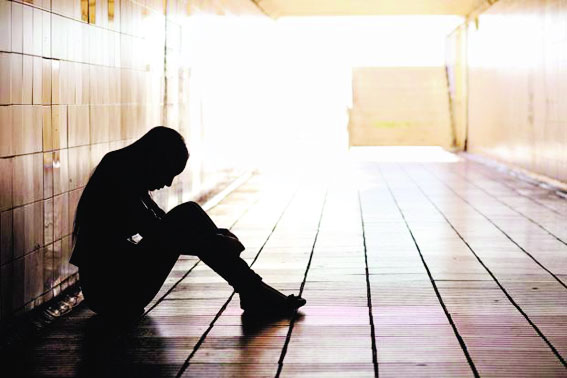It’s troubling that women have a higher rate of mental ailments than men. The need is to guide them so that they can emerge from the inner recesses of conservative and patriarchal households
Women in India have traditionally been perceived to be two-three times more vulnerable than men to mental ailments, stemming from psycho-social factors and extensive biological and hormonal changes they experience throughout their lives. This belief has now been substantiated by data from the National Mental Health Survey (NMHS) 2015-16, which validates fear that unrelenting physical and mental pressures are gradually pushing many Indian women over the mental precipice.
The survey, which was conducted by the National Institute of Mental Health and Neurosciences (NIMHANS), Bengaluru, and supported by the Ministry of Health and Family Welfare, spanned 12 States representing different regions, yet revealed surprisingly similar outcomes. The NMHS documents female predominance for depression (affecting three per cent of the female respondents as compared to 2.4 per cent of their male counterparts), neurotic and stress-related disorders (suffered by 4.3 per cent of females as against 2.7 per cent males), and desolation and phobic anxiety resulting from divorce, separation or widowhood (again afflicting 9.8 per cent of females in contrast to only 2.2 per cent of males).
One of the primary causes of psychological distress among women is their vulnerability to sexual violence, which is affirmed by both waves of the India Human Development Survey (IHDS), a multi-topic panel study of over 40,000 households, conducted jointly by the National Council of Applied Economic Research (NCAER), and University of Maryland in 2004-05 and 2011-12 respectively. The IHDS found that 20 per cent of the women in the respondent households complained of sexual harassment in 2005, which went up to 31 per cent of the female respondents in the same households in 2012. Moreover, for both men and women, the perception of sexual harassment and associated mental torment increased by almost 10 percentage points between 2005 and 2012 in the same neighbourhoods. The assumption that many of these female respondents could be potential victims of mental morbidities may be corroborated by the 58th Round of the National Sample Survey (NSS) on “Disabled Persons in India” (July-December 2002).
The NSS recorded that among women, who were born with normal mental sensibilities but contracted some form of mental illness subsequently, 4.8 per cent and 23.5 per cent did so in their early 20s and mid-30s, respectively. The corresponding figures for the male respondents with mental disabilities were conspicuously lower.
A BBC news story released in February 2017, while showing disturbing pictures of women in a mental health ward at the Institute of Human Behaviour and Allied Sciences in Delhi, claimed that mental illness is “not the only war the women fight here-the stigma of social acceptance and gender discrimination is a major cause of their trauma”. A probe revealed that many of these inmates, abandoned here by their family members or picked up from the streets by local police, were suffering from post-traumatic psychosis caused by harrowing life experiences, like rape, child abuse, or untimely death of a parent.
Even more alarming is a report on ‘The Global Burden of Diseases Study, 1990-2016’, published recently in the Lancet Public Health Journal. This report states that in 2016, though India accounted for only 17.8 per cent of the global population, it recorded 36.6 per cent of suicides among women across the world, going up from 25.3 per cent in 1990.
Further, suicide death rate for women in India for 2016 is 15 per 1,00,000 women, which is more than twice the corresponding global rate of seven per 1,00,000 women. What are the compelling reasons that drive a large cohort of India’s women over the edge? According to Rakhi Dandona, one of the lead authors of the study, a staggering 71.2 per cent of the female suicides are by married women in the age-group of 15-39 years. Lack of agency to realise their aspirations, economic dependence, illiteracy, early marriage and young motherhood, all take a toll on them.
How can we bring these women back from the brink and prevent them from surrendering to life’s challenges? The answer lies in redefining health in accordance with the gender perspective, and the concomitant socio-economic and cultural determinants of mental health, as propounded in the WHO’s Ottawa Charter for Health Promotion (1986). Other measures entail implementing affordable, accessible and women-friendly health policies, enhancing budgetary allocations for mental healthcare, and ensuring timely diagnosis of psychiatric morbidity for women across the country.
Another step in the right direction is the initiative by the NIMHANS to train Accredited Social Health Activists (ASHAs) to act as interfaces between the female community and the public health system by counselling women on sensitive issues like pregnancy, safe deliveries, and even interpersonal relationships. However, the key intervention lies in guiding women to lead more fulfilling lives by emerging from the inner recesses of conservative and patriarchal households, and joining the social mainstream where they can verbalise their inner conflicts and dilemmas without plunging into a mental morass.
(The writer is Editor at the National Council of Applied Economic Research. Views expressed here are personal)


























